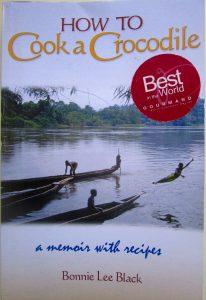Whether or not Oprah Winfrey ultimately decides to throw her hat into the ring and run for U.S. president in the 2020 election – and whatever you may think of this prospect – one thing we can all agree on here and now is that Oprah is one formidable woman. She’s brilliant, beautiful, powerful, gutsy, supremely successful and ineffably inspirational. She has fashioned herself as a force for good for our time.
I’ve never met Oprah in person, and God knows she’s never chosen one of my books for her famous book club. I confess I’ve never watched any of her TV shows from beginning to end (but I did subscribe to her “O” magazine for a while). It was watching her eight-minute rousing speech at the Golden Globe Awards last Sunday that lifted me up and made me want to salute her. What a speech. What a woman. What an inspiration.
But in my experience, Oprah is not alone in possessing these qualities. She reminds me, especially, of some of the formidable women I met in Africa when I lived in three different African countries, for a total of seven years — women who took my breath away, women who taught me by example what near-super-human-strength and determination are.
I wrote about such women in my two Africa memoirs, How to Cook a Crocodile (2010), and How to Make an African Quilt (2013). There are too many such women in these books to encapsulate here, so I’ll focus on just one: Denise Nimba, whom I met when I served in the Peace Corps in Gabon, Central Africa, from 1996 to 1998.
Madame Nimba, as she was known in Lastoursville, the little town in the center of Gabon where I was posted, was a stocky Cameroonian woman restaurateur, who was married to a Gabonese bureaucrat. Her restaurant, Chez Madame Nimba’s, had been written up in the Lonely Planet guide as the best in town. The fact that it was the only restaurant in town worth writing anything about, and few if any tourists traipsed through the town (due to its oppressive equatorial heat and humidity, not to mention its battalions of malaria-carrying mosquitoes), didn’t deter her. She kept her restaurant’s doors open, and she made outstanding food.
It was there that I first tasted crocodile stew – and later asked her to teach me how to make it (a recipe for which is in my book). But I’m getting ahead of myself…
“I’d sensed,” I wrote, “whenever I’d observed Madame Nimba from a distance in town or at church, that she was a prickly, formidable woman. She seemed to be wearing armor that made her already heavy body even heavier. She walked slowly, as though carrying a great weight, even when she carried nothing on her head or in her hands” (p. 66).
But she had a lovely, lilting singing voice. She often sang solos in church and led her church’s congregation in singing. It was this singing that drew me to the small brick-and-cinderblock church down the hill from my house.
“Madame Nimba was a pillar of this tiny church, and I loved to see her leadership skills in action. Sometimes she would slowly, confidently stride up to the front by the pulpit to lead the congregation in the heart-stirring old hymn, “How Great Thou Art.” Like the self-appointed general of this small army of Christian soldiers, she commanded us all to sing the words in our own language, whatever that language might be – Inzebi, Bateki, Banjabi, French, or English” (p. 68).
Being a part of this blend of voices using disparate words to express such praise brought tears to my eyes every time.
It took some pleading on my part, but when she finally agreed to give me a private cooking lesson in how to make crocodile stew, Madame Nimba opened up to me. I learned the reason for her heavy heart. Little by little, as she chopped, first onions, then ginger, garlic, and lemon grass, she told me about her daughter’s murder. She wiped her tears away with the back of her hand. But she pressed on.
“All of the ingredients went into the pot, along with chopped canned tomatoes, fresh hot peppers, and a healthy dollop of salt. She covered all of the ingredients with water and put the covered pot on the open, outdoor fire” (p. 73).
Then she looked up at me and smiled a brave smile and told me how much she loved to cook and to sing. Her lesson in strength and survival that day became the title of my book:

But to return to Oprah…. Would she make an able, inspiring president? No doubt about it. Would she be elected president, given the current president’s unleashing of hideous, heightened, overt racism and misogyny in the U.S.A.? Doubtful, in my opinion. Would our current president benefit from serving as a Peace Corps volunteer in any of the countries in Africa (which he described so vulgarly this week)? Absolutely. But it’s too late for that to happen, I’m sure. (See my WOW post “At Home in the World,” dated January 8, 2017, for more on this subject.)
The situation, at times, feels hopeless. But, as the old song from the Broadway show Damn Yankees goes, “…You gotta have hope! Mustn’t sit around and mope….”
The dedication in my second Africa memoir, How to Make an African Quilt, reads: “To African women, who are the hope” — meaning the hope for Africa. Formidable American women, like Oprah, God bless her, in whatever capacity that they choose to shine and to lead, are, I believe, the best hope for the U.S.A.
